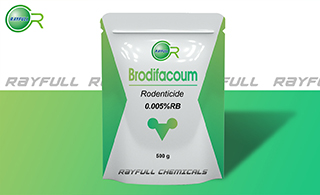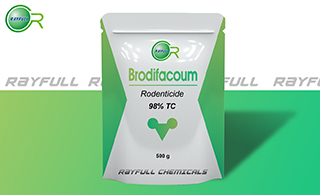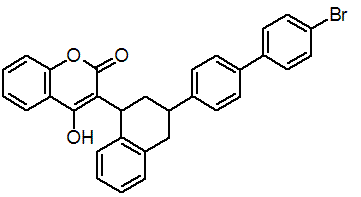BRODIFACOUM
  溴鼠灵 溴鼠灵
Introduction: A coumarin rodenticide used inside buildings.
Common name: Brodifacoum
Another name: Bromfenacoum, Klerat, Talon, Volid, Talon rodenticide, Brodifakum, Super warfarin, superwarfarin, Brodimat, Klerat Block, etc.
Chemical name: 3-[(1RS,3RS;1RS,3SR)-3-(4'-bromobiphenyl-4-yl)-1,2,3,4-tetrahydro-1-naphthyl]-4-hydroxycoumarin
Empirical formula: C31H23BrO3
Structural formula:

Mol. Weight: 523.4 g/mol
CAS No.: 56073-10-0
Specifications
Leading Brodifacoum supplier
Brodifacoum 0.005% RB
Brodifacoum 0.25% TK
Brodifacoum 2.5% TK
Brodifacoum 98% TC
Packing:
BULK PACKING
Solid: 25kg/Bag, 25kg/Drum, 50kg/Drum etc.
SMALL PACKING
Solid: 1kg/Alu bag, 500g/Alu bag, 200g/Alu bag, 100g/Alu bag, 50g/Alu bag, 15g/Alu bag etc.
Customerized packing label
Brodifacoum FAO standard
Professional registration
HAZARDS IDENTIFICATION
Hazard statement(s)
H300: Fatal if swallowed.
H310: Fatal in contact with skin.
H372: Causes damage to organs through prolonged or repeated exposure.
H410: Very toxic to aquatic life with long lasting effects.
Precautionary statement(s)
P260: Do not breathe dust/fume/gas/mist/vapors/spray.
P262: Do not get in eyes, on skin, or on clothing.
P264: Wash ... thoroughly after handling.
P270: Do not eat, drink or smoke when using this product.
P273: Avoid release to the environment.
P280: Wear protective gloves/protective clothing/eye protection/face protection.
P301+P310: IF SWALLOWED: Immediately call a POISON CENTER/doctor/...
P302+P350: IF ON SKIN: Gently wash with plenty of soap and water.
P310: Immediately call a POISON CENTER or doctor/physician.
P314: Get medical advice/attention if you feel unwell.
P321: Specific treatment (see ... on this label).
P322: Specific measures (see ...on this label).
P330: Rinse mouth.
P361: Take off immediately all contaminated clothing.
P363: Wash contaminated clothing before reuse.
P391: Collect spillage.
P405: Store locked up.
P501: Dispose of contents/container to ...
Supplemental Hazard Statements: none
MAMMALIAN TOXICOLOGY
Acute toxicity: 1) Acute oral LD50 for rat: 0.4 a.i.mg/kg. 2) Acute dermal LD50 for rat: 0.3 a.i.mg/kg. 3) Inhalation LC50 (4 h) for rat: 0.004 a.i.mg/L. 4) Slight to mild skin irritant (rabbits). 5) Slight to mild eye irritant (rabbits). 6) A moderate skin sensitiser (guinea pigs).
Not teratogenic, embryotoxic or fetotoxic in rats or rabbits at doses up to 0.02 mg/kg/day- the dose causing excessive maternal toxicity. Non-genotoxic in a range of assays. Unlikely to be carcinogenic.
Classification:
Toxicity class WHO (a.i.): Ia (Extremely hazardous)
US EPA Classification (formulation): I (Danger - Highly toxic)
EC Risk Classification: T+ - Very toxic: R26/27/28; T - Toxic: R48/24/25; Xn - Harmful: R43; N - Dangerous for the environment: R50, R53
ECOTOXICOLOGY
Effect on birds: high toxicity to birds, acute oral LD50 for Mallard ducks is >0.31 a.i.mg/kg. Effect on fish: high toxicity to fish, acute 96 hour LC50 for Rainbow trout is 0.051 a.i.mg/L. Effect on aquatic invertebrates: moderate toxicity to aquatic invertebrates, acute 48 hour EC50 for Daphnia magna is 0.98 a.i.mg/L. Effect on earthworms: moderate toxicity to earthworms, acute 14 day LC50 for Eisenia foetida is >994 a.i.mg/kg.
ENVIRONMENTAL FATE
Brodifacoum's production may result in its release to the environment through various waste streams; its use as a rodenticide will result in its direct release to the environment. If released to air, an estimated vapor pressure of 1.1×10-18 mm Hg at 25 deg C indicates brodifacoum will exist solely in the particulate phase in the ambient atmosphere. Particulate-phase brodifacoum will be removed from the atmosphere by wet and dry deposition. If released to soil, brodifacoum is expected to have no mobility based upon an estimated Koc of 1.4×105. Volatilization from moist soil surfaces is not expected to be an important fate process based upon a Henry's Law constant of 2.2×10-8 atm-cu m/mole. In an aerobic soil, the half-life of brodifacoum is 157 days, suggesting that biodegradation may occur in soil or water. If released into water, brodifacoum is expected to adsorb to suspended solids and sediment based upon the estimated Koc. Volatilization from water surfaces is not expected to be an important fate process based upon this compound's Henry's Law constant. An estimated BCF of 570 suggests the potential for bioconcentration in aquatic organisms is high. Brodifacoum is stable to hydrolysis in the environment. Brodifacoum is degraded by UV light when in solution.
Usage: Rodenticide reported by R. Redfern et al. (J. Hyg., 1976, 77, 419). Introduced by Sorex (London) Ltd (now Sorex Ltd) and developed by ICI Agrochemicals (now Syngenta AG). First marketed in 1978. Patents: GB 1458670 to Sorex. Manufacturers: Bell; Sorex; Syngenta. Biochemistry: Inhibits the vitamin K-dependent steps in synthesis of clotting factors II, VII, IX and X.
Application: Indirect anticoagulant. Controls most rodent pests, including Rattus norvegicus, R. rattus, Mus musculus and M. domesticus, at lower rates than many other anticoagulants (e.g. warfarin and pindone); also Cricetus cricetus, Mesocricetus auratus, Microtus pennsylvanicus, M. pinetorum, R. argentiventer, R. rattus mindanensis and rodents, such as hamsters, that are difficult to control with other anticoagulants. Potency is such that a rodent may absorb a lethal dose by taking a 50 mg/kg bait as part of its food intake on only one occasion.
| 






